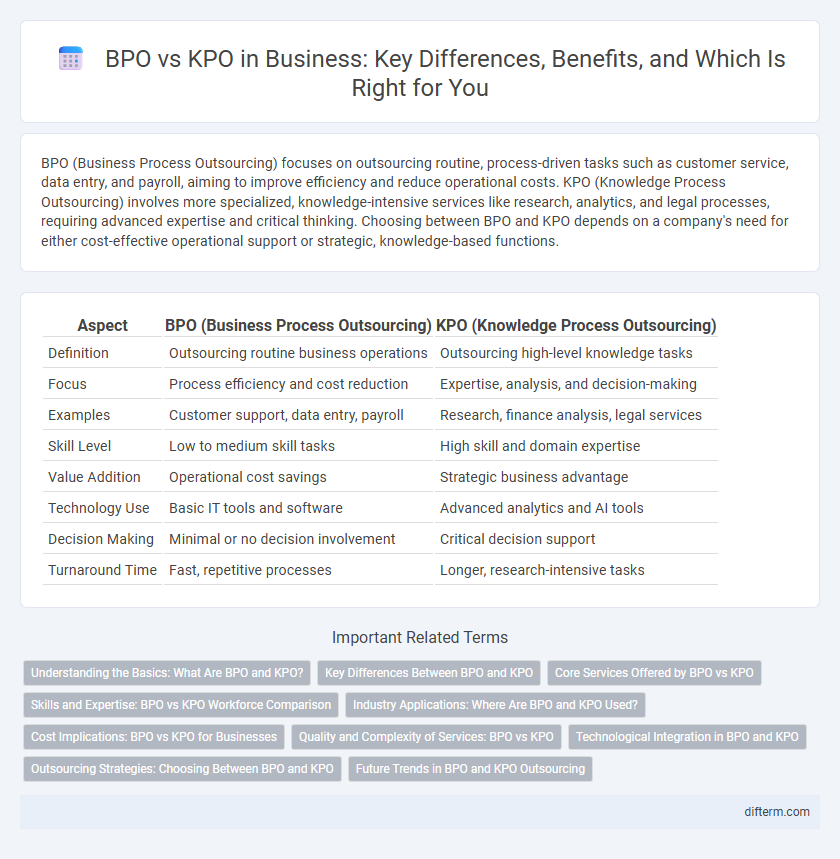BPO (Business Process Outsourcing) focuses on outsourcing routine, process-driven tasks such as customer service, data entry, and payroll, aiming to improve efficiency and reduce operational costs. KPO (Knowledge Process Outsourcing) involves more specialized, knowledge-intensive services like research, analytics, and legal processes, requiring advanced expertise and critical thinking. Choosing between BPO and KPO depends on a company's need for either cost-effective operational support or strategic, knowledge-based functions.
Table of Comparison
| Aspect | BPO (Business Process Outsourcing) | KPO (Knowledge Process Outsourcing) |
|---|---|---|
| Definition | Outsourcing routine business operations | Outsourcing high-level knowledge tasks |
| Focus | Process efficiency and cost reduction | Expertise, analysis, and decision-making |
| Examples | Customer support, data entry, payroll | Research, finance analysis, legal services |
| Skill Level | Low to medium skill tasks | High skill and domain expertise |
| Value Addition | Operational cost savings | Strategic business advantage |
| Technology Use | Basic IT tools and software | Advanced analytics and AI tools |
| Decision Making | Minimal or no decision involvement | Critical decision support |
| Turnaround Time | Fast, repetitive processes | Longer, research-intensive tasks |
Understanding the Basics: What Are BPO and KPO?
Business Process Outsourcing (BPO) involves contracting standard operational tasks such as customer service, payroll, and data entry to external providers to improve efficiency and reduce costs. Knowledge Process Outsourcing (KPO) focuses on outsourcing more specialized, knowledge-intensive activities like market research, legal services, and data analysis requiring expertise and advanced analytical skills. Understanding these distinctions helps businesses strategically decide which processes to outsource based on complexity, required skill sets, and value addition.
Key Differences Between BPO and KPO
BPO (Business Process Outsourcing) primarily handles routine, process-driven tasks such as customer service, payroll, and data entry, aimed at cost reduction and operational efficiency. KPO (Knowledge Process Outsourcing) involves specialized services like market research, legal services, and financial analysis that require domain expertise and advanced analytical skills. The key differences lie in the complexity of tasks, skill requirements, and the strategic value they provide to businesses.
Core Services Offered by BPO vs KPO
BPO (Business Process Outsourcing) primarily offers core services such as customer support, data entry, payroll processing, and IT helpdesk management, focusing on standard, repetitive tasks to enhance operational efficiency. KPO (Knowledge Process Outsourcing) provides specialized, knowledge-intensive services including market research, data analytics, legal services, and financial consulting that require domain expertise and advanced analytical skills. The fundamental distinction lies in BPO's emphasis on process-driven functions, while KPO centers on expert-driven decision-making and strategic insights.
Skills and Expertise: BPO vs KPO Workforce Comparison
BPO workforce primarily handles routine, process-driven tasks requiring basic operational skills, such as data entry, customer support, and transaction processing. In contrast, KPO professionals possess advanced domain expertise, analytical abilities, and problem-solving skills to manage knowledge-intensive activities like market research, legal services, and financial analysis. The specialized skillset in KPO results in higher value delivery and strategic contributions compared to the task-oriented focus of BPO.
Industry Applications: Where Are BPO and KPO Used?
BPO (Business Process Outsourcing) is widely used in customer service, payroll processing, and data entry across industries like retail, healthcare, and finance, optimizing operational efficiency. KPO (Knowledge Process Outsourcing) caters to specialized sectors such as market research, legal services, and financial analysis, providing expert-driven insights and strategic decision support. Both BPO and KPO enhance business productivity but target different industry applications based on complexity and expertise requirements.
Cost Implications: BPO vs KPO for Businesses
Business Process Outsourcing (BPO) typically offers lower operational costs by handling standardized, repetitive tasks, which reduces labor expenses and infrastructure investment. Knowledge Process Outsourcing (KPO), while more expensive due to its focus on specialized, knowledge-intensive services, delivers higher value through expertise-driven insights and decision-making support. Choosing between BPO and KPO depends on a company's budget constraints and the strategic importance of the outsourced function's complexity.
Quality and Complexity of Services: BPO vs KPO
Business Process Outsourcing (BPO) primarily handles standardized, volume-driven tasks such as customer support and data entry, emphasizing operational efficiency rather than high complexity. Knowledge Process Outsourcing (KPO) involves specialized services requiring domain expertise, analytical skills, and decision-making, focusing on quality and insight-driven outcomes. The distinct difference lies in KPO's ability to deliver complex, knowledge-intensive solutions, whereas BPO centers on streamlined, transactional processes.
Technological Integration in BPO and KPO
Technological integration in BPO primarily involves automating routine, transactional processes through robotic process automation (RPA) and cloud computing, enhancing efficiency and cost-effectiveness. In contrast, KPO leverages advanced analytics, artificial intelligence, and machine learning to deliver knowledge-intensive services like market research, data analysis, and intellectual property management. Both BPO and KPO increasingly rely on digital transformation, but KPO focuses more on innovation-driven tools to support complex decision-making and strategic insights.
Outsourcing Strategies: Choosing Between BPO and KPO
Outsourcing strategies in business often involve choosing between Business Process Outsourcing (BPO) and Knowledge Process Outsourcing (KPO), where BPO focuses on cost-efficient, standardized tasks like customer service and data entry. KPO demands specialized expertise and analytical skills, handling complex processes such as market research, legal work, and financial analysis to drive strategic decisions. Selecting between BPO and KPO depends on a company's need for operational efficiency versus innovation and knowledge-driven growth.
Future Trends in BPO and KPO Outsourcing
The future of BPO and KPO outsourcing is shaped by increasing adoption of artificial intelligence, automation, and data analytics to enhance efficiency and decision-making. Rising demand for specialized knowledge services in KPO drives businesses to seek high-value expertise in sectors like finance, healthcare, and legal. Hybrid outsourcing models integrating advanced technologies and human intelligence are optimizing cost-effectiveness and innovation for global enterprises.
BPO vs KPO Infographic

 difterm.com
difterm.com